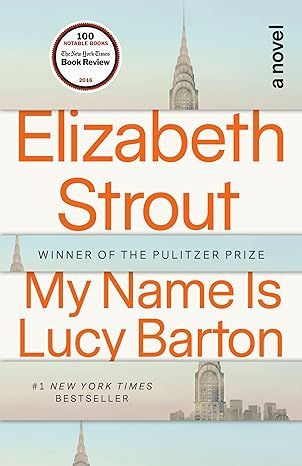My Name Is Lucy Barton: A Novel
3.8 out of 5
36,168 global ratings
#1 NEW YORK TIMES BESTSELLER • LONGLISTED FOR THE BOOKER PRIZE • A simple hospital visit becomes a portal to the tender relationship between mother and daughter in this “spectacular” (The Washington Post) novel by the Pulitzer Prize–winning author of Olive Kitteridge and The Burgess Boys.
“An aching, illuminating look at mother-daughter devotion.”—People
A BEST BOOK OF THE YEAR: Time, The Washington Post, The New York Times Book Review, NPR, San Francisco Chronicle, Minneapolis Star Tribune, St. Louis Post-Dispatch, Miami Herald, The Guardian Slate, BookPage, LibraryReads, Kirkus Reviews
Lucy Barton is recovering slowly from what should have been a simple operation. Her mother, to whom she hasn’t spoken for many years, comes to see her. Gentle gossip about people from Lucy’s childhood in Amgash, Illinois, seems to reconnect them, but just below the surface lie the tension and longing that have informed every aspect of Lucy’s life: her escape from her troubled family, her desire to become a writer, her marriage, her love for her two daughters. Knitting this powerful narrative together is the brilliant storytelling voice of Lucy herself: keenly observant, deeply human, and truly unforgettable.
240 pages,
Kindle
Audiobook
Hardcover
Paperback
Audio CD
First published October 10, 2016
ISBN 9780812979527
About the authors
Elizabeth Strout
Elizabeth Strout is the author of the New York Times bestseller Olive Kitteridge, for which she was awarded the Pulitzer Prize; the national bestseller Abide with Me; and Amy and Isabelle, winner of the Los Angeles Times Art Seidenbaum Award and the Chicago Tribune Heartland Prize. She has also been a finalist for the PEN/Faulkner Award and the Orange Prize in London. She lives in Maine and New York City.
Read more
Reviews
Eric Selby
5
Elizabeth Strout: A Writer's Writer
Reviewed in the United States on January 19, 2016
Verified Purchase
Elizabeth Strout: A Writer’s Writer Eric Selby Olive Kitteridge deserved the Pulitzer Prize in Literature in 2009. And were I on that committee for this year, my vote would be cast for My Name Is Lucy Barton (even though I don’t think the title is a good one for what this amazing novel offers the reader). These two Elizabeth Strout novels are both very much alike thematically but oh-so-very different, revealing just how skilled Strout is with her craft. I chuckled when, on a recent “Fresh Air” (NPR) interview with Terry Gross, the author said of Olive when asked about how she developed the character: “I just let her rip!” Indeed Olive does exactly that. But Lucy, highly traumatized from her childhood (as is everyone in that household, or so we are led to believe as we move through the novel), is so unlike Olive. Lucy is sweet, caring, a woman who sees the good in others. (Olive does occasionally as well.) Olive Kitteridge, written in third person and in a series of inter-related stories that emerge as a novel, is so unlike the first-person Lucy fictional memoir because that is what this novel is: written as a memoir. Lucy herself is a novelist—and published—and has taken a writing workshop with another well respected writer of fiction, Sarah Payne. (But should you decide to look for the books each has published, you’ll find nothing! Will Elizabeth Strout now assume those two identities and write—and publish in their names—their works?) The novel is just under 200 pages and in short chapters. Lucy Barton (her original name and we never do learn what her husband’s last name is—at least I don’t recall that we do) is a wife and mother of two daughters. Lucy, in the mid-80s and as the AIDS epidemic was emerging into public awareness, has been hospitalized for an appendectomy. But complications emerge, resulting in her being in that New York City hospital for several weeks. She can see the Chrysler Building from her bed. Her husband comes only twice to see her. And when he brings their daughters, Lucy can see that the woman who is caring for them isn’t doing a good job. But Lucy says nothing. (This woman will emerge at the end of the novel in a surprising role.) Lucy Barton loves her Big Apple life, an escape from the small Illinois town where she spent a terrible childhood, sometimes locked in her father’s truck when he and her mother were at work. One time a snake spent the day in the cab with her—and this is one of the traumas she has never conquered. Her brother slept occasionally with the pigs and wore, occasionally, women’s clothing. And then there was this issue: “What as a child I had called—to myself—the Thing, meaning an incident of my father becoming very anxious and not in control of himself.” The reader will not discover for certain what the Thing is until near the end when it becomes the central image representing what occurs in this novel. This is a family that cannot confront the abuse, the total dysfunction that has such deep roots, hence why I say the novel has a similar theme to the one the runs through Olive Kitteridge where so many characters are depressed and often suicidal. For Lucy it was the discovery of books in third grade that saved her and then propelled her into her life as an author. (Based on the interview with Terry Gross, I realize that Elizabeth Strout had a wonderful childhood, living in the home of parents who were college professors at the University of New Hampshire. She spoke so lovingly of both parents.) Lucy has not only not seenhermother since she left that little Illinois town but hasn’t heard from her either. Her mother has never seen her two New York City grandchildren, has never met their father. But suddenly she walks into Lucy’s hospital room. And there she stays for five days. Most of the novel involves what they talk about—and what they avoid talking about—during those days. But she doesn’t ever meet the granddaughters or son-in-law while in New York. The story emerges in oblique language. But not so oblique that the reader is left confused. That is the skill Lucy Barton has as a writer which, of course, means the skill the author herself has in writing this fictional memoir. Fragile and oh-so-very-sweet, Lucy is, in her words, “so happy. Oh, I was happy speaking with my mother this way.” Lucy has the ideal doctor—and she sort of falls in love with him. She has wonderful nurses for whom she and her mother select names representing their feelings toward the care takers. This is also a novel about what makes a good novelist, with this advice from Sarah Payne: “If you find yourself protecting anyone as you write [about them], remember this: You’re not doing it right.” That’s definitely the voice of the author of My Name Is Lucy Barton. As those of us who have read Olive know, Elizabeth Strout does not protect her protagonist. And she certainly doesn’t protect Lucy either. And finally this from the chapter on pages 96-99 which I think is priceless, Elizabeth Strout’s opportunity through Sarah Payne to rebuke readers who write “reader reviews” in which they confuse the author’s views with the views of the characters created by the author, those types of reviews I ignore (I just didn’t like Olive Kitteridge as a person. I wish the author made her nicer. To which I want to write—and have occasionally—Then read Heidi!)
Read more
37 people found this helpful
Marie
5
Amazingly talented writer creates an absorbing character study that is so hard to put down!
Reviewed in the United States on February 5, 2016
Verified Purchase
I LOVE Elizabeth Strout’s writing! “Olive Kitteridge” is one of my favorite books, and this reminded me of that novel in the beginning, but it was a very different kind of book. “Olive Kitteridge” is a collection of short stories which involved characters in the same town whose lives intersected, some in very major, others minor ways. This book was told by a single narrator and even though it was divided into chapters, it flowed like one continuous story. The writing is profound and soul-searching, and her characters are so deeply human. Such depth of emotion and feeling are felt while reading this.
“My name is Lucy Barton” begins with the narrator reflecting on a particular time in her life when she was hospitalized for appendicitis which becomes complicated by persistent fever following the surgery. This was a pivotal point in the a narrator’s life to reflect back on her childhood with the poverty and abuse that accompanied it and well as project forward into the future as to what she wanted from life and what was to become her life.
There is a powerful dialogue between Lucy and her mother within the hospital and during this, what goes unsaid is just as important, maybe more important than what is said. The mother tells Lucy story after story of failing marriages, but there is hardly a mention of Lucy’s father.
Sarah Payne, a character in the novel later tells Lucy of her writing about this time period: ” This is a story about love, you know that. This is a story of a man who has been tortured every day of his life for things he did in the war. This is the story of a wife who stayed with him, because most wives did in that generation, and she comes to her daughter’s hospital room and talks compulsively about everyone’s marriage going bad, she doesn’t even know it, doesn’t even know what she’s doing. This is a story about a mother who loves her daughter. Imperfectly. Because we all love imperfectly.” This quote sums of the book amazingly well. The book also speaks to memory and how we can all remember things differently. How we may choose to hide certain memories or pretend things never happened to cover up for the people we love. It is shocking towards the end, that she speaks with her brother and sister regularly and how much they choose not to speak about or ask each other about. Lucy Barton is reminded by Sarah Payne, “to go to the page without judgement” reminding her “that we never knew, and never would know, what it would be like to understand another person fully.”
Another quote from the book that I really liked: “It interests me how we find ways to feel superior to another person, another group of people. It happens everywhere, and all the time. Whatever we call it, I think it’s the lowest part of who we are, this need to find someone else to put down.” Throughout the book, Lucy feels distanced and alienated from others because of her poor upbringing. She and her family were ignored by others in town, and when she went off to college, she often felt that others made comments conveying that they were feeling superior to her circumstances. She comments to her friend, Jeremy, that she envied the men with HIV, because at least they had a community.
This book is filled with love, but also with feelings of melancholy, sadness, fear, terror, loneliness, abandonment. The characters, feelings, relationships and sentiments are described in such a real, human manner, that the book is very affecting. I highly recommend this book to anyone, but do think it would appeal more to women. It was a book that I did not want to end because I loved it so much, but it was just perfect the way it was!
For more of my book reviews, please visit http://www.book-chatter.com
Read more
11 people found this helpful
ronni
5
Excellent and lovely
Reviewed in the United States on September 23, 2024
Verified Purchase
I am looking forward to reading all the books in the series! Hopefully there will be a TV Series in the near future!
Sandra Fox Murphy
4
Oh! To be inside Lucy’s head!
Reviewed in the United States on May 15, 2024
Verified Purchase
Elizabeth Strout’s stories stand out as different. Years ago, I read Olive Kitteridge via Audible and found it odd; it took the whole story to bond me with that character. Perhaps, the author's goal was to make me judge her characters, until I truly knew her. Recently, I found Olive's story had been filmed in a short series, and I loved Frances McDormand’s performance as Olive. Now, I’ve gone back to read about Lucy Barton. I always wonder where these stories come from, for it seems the author’s youth was much different than Lucy’s. Clearly, Lucy carried great suffering with her, yet at the same time, we don’t always recognize how the use of short sentences, contrary to much writing guidance, gives a certain weight to the words, strengthens the character’s story. It’s as if all the extraneous was cut, edited out. Lucy’s internal struggle carries the reader from page to page, to the end, where Lucy has found her way through the barriers and doubts that we all struggle with as we find our way. Of course, now I want to read more of Lucy’s stories, as well as more of Olive’s stories. And there are more.
Read more
Elizabeth
4
Elizabeth Strout has done it again!
Reviewed in the United States on August 10, 2017
Verified Purchase
For the second time, Elizabeth Strout has taken my breath away. Her prose and stories have this way of nudging right into the achy spots of my soul and I end up going off to do deep soul searching for a couple of days once I have finished her book (I’ve only read two of her books, but she is two-for-two if she is keeping score).
The story opens with Lucy recovering in a hospital bed from complications after a simple operation and is told from her voice through a series of conversations with her mother that provoke memories and introspection about Lucy’s childhood. She has been away from home for a long time, and her mother’s presence at her bedside ignites gentle conversation about their family’s past. Lucy has a deep ache to share things about her life with her mother, such as her desire to be a writer, issues in her marriage, and the joy of raising her two young daughters. But she also wants some answers.
Strout has a way of weaving beautiful stories around circumstances that many of us find uncomfortable. We see the characters truly struggle with issues that make them so, so very human. I read her 2009 Pulitzer Prize winning Olive Kitteridge years ago and recall one of the main themes being about suicide and the deeply complex emotions that surround it. I loved it, but had to read something light and fluffy afterwards to give myself a break.
Lucy Barton’s struggle is about poverty and how society sometimes holds it against people even though they (specifically children) may not have a choice in their circumstances. She spoke about poverty in a way that was new to me in literary journey, speaking about how society perceives her as less than the rest of humanity and the inability to separate herself from the stigma of it even after she has physically removed herself from the situation, rather than the poverty as an issue itself. Here is an example where she was talking to her college lover and felt the need to hide her past, but he still manages to strike the nerve:
“Still, I loved him. He asked what we ate when I was growing up. I did not say, ‘Mostly molasses on bread.’ I did say, ‘We had baked beans a lot.’ And he said, ‘What did you do after that, all hang around and fart?’ Then I understood that I would never marry him. Its funny how one thing can make you realize something like that. One can be ready to give up the children one always wanted, one can be ready to withstand remarks about one’s past or one’s clothes, but then – a tiny remark and the soul deflates and says: Oh. “
It seems to me that her parents were perfectly comfortable with their poverty status and Lucy has trouble resolving this against her own conflicting ideals and perceptions of her parents’ responsibility in their situation. The story has the subtle undercurrent of her spirit saying to her mother “This is not ok! How could you let us be those kids that showed up to school smelly and in dirty clothes? How could you not notice?” At times, when Lucy is finally holding her mother accountable, her mother would wave it away and change the subject. This was the most heartbreaking part for me… It is tragic when the grown child finally looks at the parent and asks “Why?” and it falls on deaf ears, or ears that either cannot or will not acknowledge the answers that the child so desperately needs.
“This must be the way most of us maneuver through the world, half knowing, half not, visited by memories that can’t possibly be true. But when I see others walking with confidence down the sidewalk, as though they are free completely from terror, I realize I don’t know how others are. So much of life seems speculation.“
I read My Name Is Lucy Barton in about four hours, and discovered it while I was considering Strout’s newer release Anything is Possible. Apparently, Lucy Barton connects the two stories, but I’m not clear how yet. It looks like something I would enjoy so I opted to go ahead and read My Name is Lucy Barton before reading Anything is Possible. I expect to read the new one in a couple of months.
I need to read more of Elizabeth Strout’s work. She truly is a master of her craft and I feel like I might be missing out by not doing so.
Let me know if you have read any of her work, and what your thoughts are. Cheers!
-E
Note: This post was not sponsored in any way.
Read more
22 people found this helpful
Donna D
4
Wow!
Reviewed in the United States on September 26, 2024
Verified Purchase
A very poignant and sad story. This story sort of just ends. There is no big deal, it just mercifully ends. I love the way the writer tells the story! .
Laurel-Rain Snow
4
EMOTIONALLY IMPOVERISHED
Reviewed in the United States on May 10, 2016
Verified Purchase
From the very beginning of
12 people found this helpful
Amazon Customer
3
Thought provoking, depressing, worth the read.
Reviewed in the United States on March 12, 2016
Verified Purchase
This is a difficult review to write. Just as this was a difficult book to read. Difficult only because of it's starkness, abruptness, one note tune. Not bad. But depressing. But that is the world of Lucy. Lucy who has apparently escaped a childhood of severe poverty and unhappiness to lead a successful life that is still not happy as the rot from her childhood years still eats at her soul. Yes there are many "gems" of insight into the "human condition" all delivered in the reporter style that is the voice of this character Lucy Barton. Unfortunately sometimes it feels that was the purpose of the author. To find a vehicle to be able to deliver her thoughts on human nature and sometimes these statements feel contrived, pushed on the reader. Then again I feel guilty for finding fault as that is the worst thing we do as humans per Lucy. This book is not a light read no matter the short length. If you give it the energy it requires it will make you think and ponder it you should. For those of us who grew up with people who talked, communicated their thoughts and shared their feelings this book will feel very foreign. But it will give you insight into the world of friends or in-laws who grew up in abuse or poverty and have been damaged by that upbringing - and don't even know it themselves. This story is a look at the dark side of family relationships. It is stark. It is depressing. It is real. It is worth the read if you give the book the quiet focus it requires - the imagining of the things danced around, hinted at. If you are looking for Lucy's story to be served as Thanksgiving dinner on a shiny platter with all the trimmings of a feast there for easy consumption you will be disappointed.
Read more
5 people found this helpful
HT
3
A beautiful book of past impacting the present. Strout is a favorite of mine, but this book is not.
Reviewed in the United States on January 26, 2016
Verified Purchase
This is a story, told in the first person, about Lucy Barton remembrance of her childhood as she lies in a hospital bed recuperating from an illness. She obviously had a lonely, tough, even terrible, childhood with cold parents.
Like all Elizabeth Strout's books, this novel takes a look at a past traumatic event plays out in people's lives. In this novel, that event is touched on just a couple of times in passing and is actually a series of her father's actions which she refers to as the "thing". "... I saw in my father's face great contortions, the kind that frequently preceded what as a child I had called - to myself - the Thing, meaning an incident of my father becoming very anxious and not in control of himself." [p28]
This "Thing" is layered on top of a childhood living in a physically cold garage with emotionally cold parents. Lucy could never talk about her accomplishments. As her mom visits Lucy in the hospital Lucy yearns to make a connection with her. "But it turned out I wanted something else. I wanted my mother to ask about my life I wanted to tel her about the life I wasl iving now. Stupidly - it was just stupidity - I blurted out, 'Mom, I got two stories published.' She looked at me quickly and quizzically, as if I had said I had grown extra toes, then she looked out the window and said nothing. 'Just dumb ones,' I said, 'in tiny magazines.' She still said nothing." [p 53]
Lucy struggles to push that life behind her as she finds herself. She divorces her husband and continues to write. Has she created that event in her children's lives that will affect them? "But I think I know so well the pain we children clutch to our chests, how it lasts our whole lifetime, with longings so large you can't even weep. We hold it tight, we do, with each seizure of the beating heart: This is mine, his is mine, this is mine." [p 188]
The hurts and pains we experience make us who we are and we cling to who we are regardless. Strout is an excellent writer who magnificently describes the external and internal worlds we inhabit. But in the end this is not one of my favorite novels of hers. It feels sparse and distant even though it is written in the first person. Perhaps that is what Strout intended, to have that coolness come through Lucy Barton's words.
Read more
11 people found this helpful
christine m mette
2
Disappointing
Reviewed in the United States on September 18, 2024
Verified Purchase
After reading Olive Kittredge I was really looking forward to this novel; extremely disappointing. I felt as if there was no beginning to her story as if I was still reading the prologue. I couldn't decide whether it was written like a memoir or intended to be a work of fiction. Characters were boring and humorless. I strongly suggest you bypass this novel
Read more
Top Elizabeth Strout titles
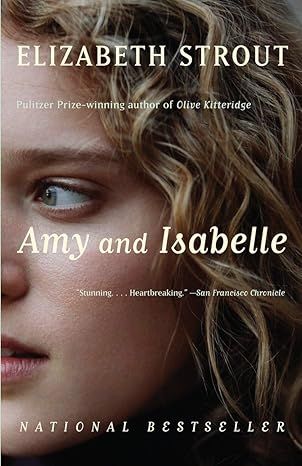
Amy and Isabelle: A novel
4.3
-
9,403
$3.34
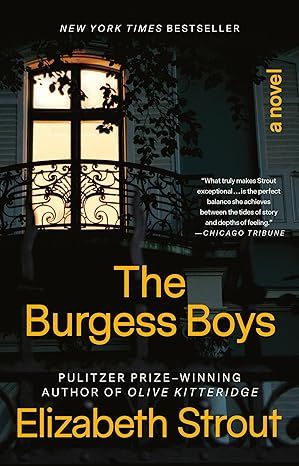
The Burgess Boys: A Novel
4.1
-
11,063
$2.11
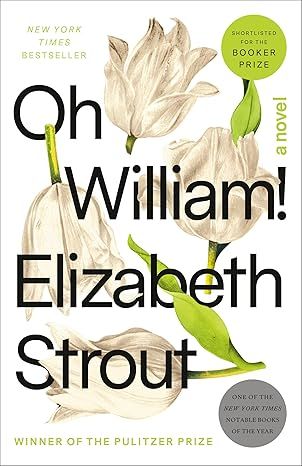
Oh William!: A Novel
4.2
-
22,498
$5.04
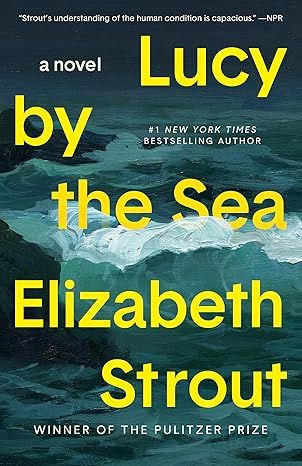
Lucy by the Sea: A Novel
4.3
-
18,461
$4.00
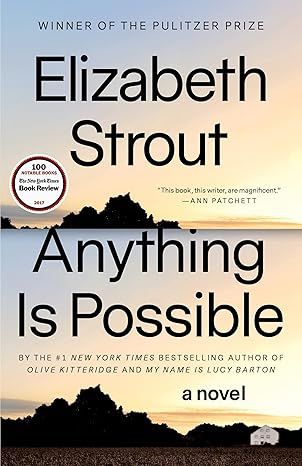
Anything Is Possible: A Novel
4
-
19,323
$5.35
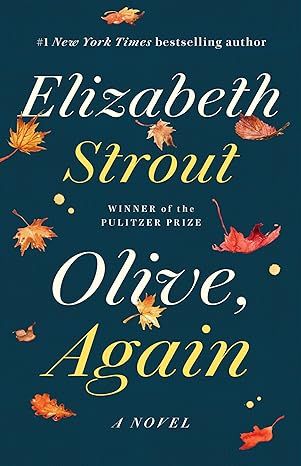
Olive, Again: A Novel (Olive, 2)
4.4
-
24,861
$9.76
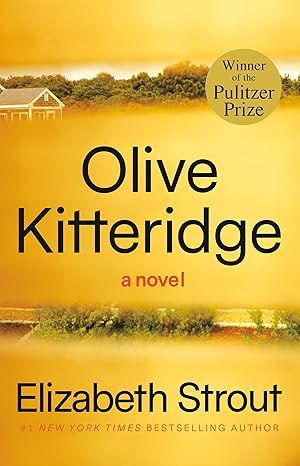
Olive Kitteridge
4.2
-
30,647
$9.49
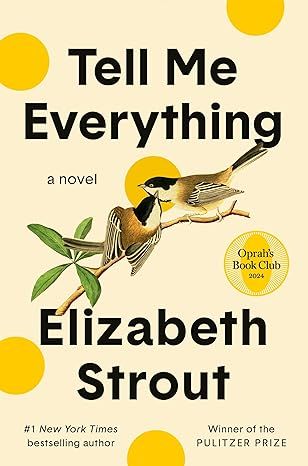
Tell Me Everything: Oprah's Book Club: A Novel
4.5
-
2,665
$14.99
Best Sellers

The Tuscan Child
4.2
-
100,022
$8.39

The Thursday Murder Club: A Novel (A Thursday Murder Club Mystery)
4.3
-
155,575
$6.33

Sapiens: A Brief History of Humankind
4.6
-
140,302
$13.49

The Butterfly Garden (The Collector, 1)
4.3
-
88,556
$9.59

Things We Hide from the Light (Knockemout Series, 2)
4.4
-
94,890
$11.66

The Last Thing He Told Me: A Novel
4.3
-
154,085
$2.99

The Perfect Marriage: A Completely Gripping Psychological Suspense
4.3
-
143,196
$9.47

The Coworker
4.1
-
80,003
$13.48

First Lie Wins: A Novel (Random House Large Print)
4.3
-
54,062
$14.99

Mile High (Windy City Series Book 1)
4.4
-
59,745
$16.19

Layla
4.2
-
107,613
$8.99

The Locked Door
4.4
-
94,673
$8.53
